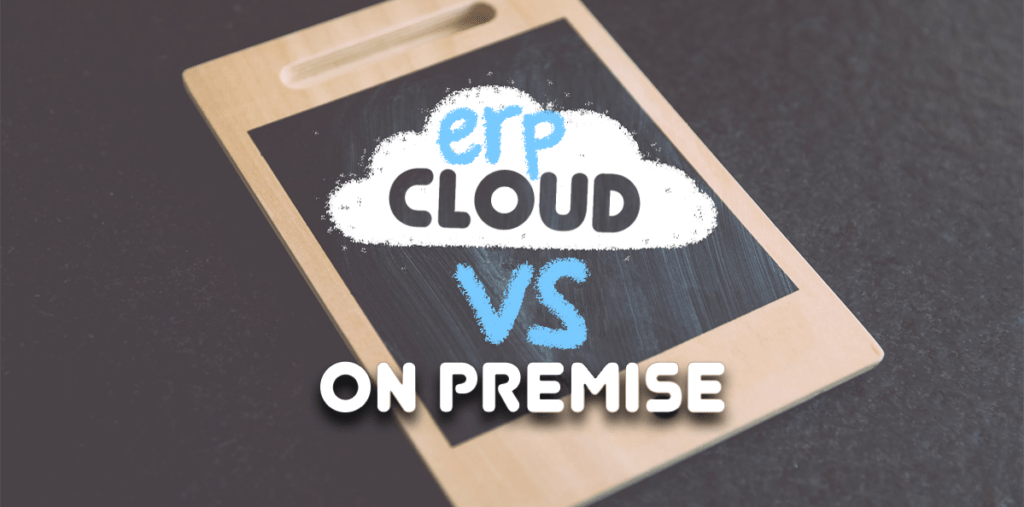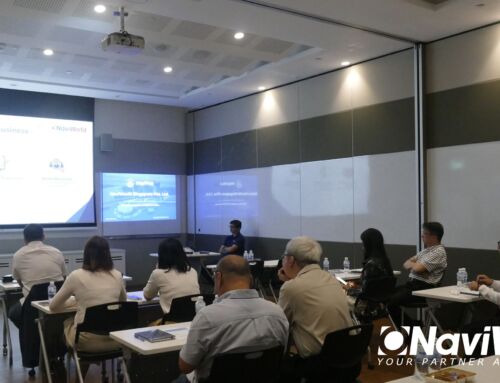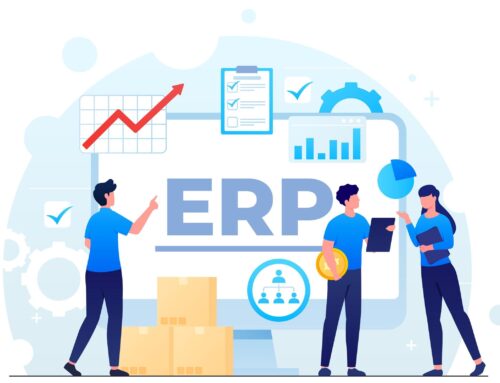ERP or On-Premise ERP – What you Need to Know
Introduction
Cloud or On-Premise ERP? In recent years, more options to acquire IT solutions such as Enterprise Resource Planning (ERP) are becoming available. Various vendors aggressively market Cloud ERP as the next new big thing.
However, as ERP is a business-critical solution, the decision can have a significant impact on a company’s well being. This article attempts to provide some pointers for companies who are looking for ERP Solutions, and deciding whether to go for cloud or on-premise ERP.
Is Cloud ERP New?
The debate of Cloud or On-Premise ERP is not new. The first cloud ERP started in Singapore in 1996. It was a government-sponsored scheme for Singapore SMEs called “MRP Online“. Coincidentally, I was the user of this first-in-the-world cloud ERP; and that was how I started my years of ERP career.
Why is ERP Different from other SaaS IT Solutions
It is essential to understand what makes cloud ERP (SaaS, Software as A Service) so different from other cloud or Saas IT solutions such as Office, CRM, Adobe Cloud, etc.
Implementation
Whether it is Cloud or On-Premise, ERP Projects require more professional services to implement. Good ERP consultants need to understand business processes and their impacts on the financial accounting of the company. Furthermore, project management is more critical and challenging. ERP projects involve many people from different departments with differing concerns. Conflict of interests among the users may arise during the project implementation.
At least half of the success factors of an ERP project depends on the quality of its implementation. It is unusual and uncommon to hear of Office365 Project failure. But, how often have you heard of ERP project challenges? ERP projects are seldom standard, unlike other SaaS solutions.
Customization
Most ERP projects, whether it is cloud or on-premise, involve some degree of customization through programming. Standard cloud IT solutions, on the other hand, are usually not customizable or require less extensive programming works.
Mission Critical
You can have your Office365 down for 2 hours, and not much would have had been affected. However, it is a different story if your ERP system is down for 2 hours, especially if you are in the retail business. Often, the latter will result in the loss of revenue or an increase in costs.
Critical Company Operations Information
ERP keeps critical and historical information of the company and its business operations that have legal, operations, and regulatory impact. Some of the information needs to be retained for several years to comply with government regulations.
Why ERP Vendors Push for Cloud
ERP Vendors promote cloud for various reasons. It is naive to believe that vendors offer SaaS ERP just because they are helping their customers.
Market Demand
The hype and increasing popularity in Saas or Cloud IT solutions have driven demand for such solutions, and vendors are just catering to this demand by extending this trend to ERP.
Good for Share Price
As it is the trend now to go on the cloud, selling the cloud version of the ERP induces a positive impact on ERP companies’ share price.
Predictable Revenue Stream
One of the significant advantages of cloud revenue to the vendor is its predictability and recurring nature. Some on-premise customers may not pay for annual license maintenance, and they can continue to use the ERP that they purchased. But if they stop paying for Saas subscription, their access to ERP may be cut-off.
Lock-down Effect
Cloud ERP has a lock-down effect on its customers. This increased “Stickiness” makes it more difficult for customers to change to another solution.
Options for Cloud or On-Premise ERP: Cloud, Hybrid and On-Premise
Depending on the ERP, there are various options for delivery of the ERP solution as the software and hardware may be treated separately:
Type |
Software |
Server |
|---|---|---|
| Public Cloud (Saas) | Subscription | Host on Public Cloud where multiple tenants share same server |
| Hybrid | Perpetual License | Host on Public or Private Cloud |
| Hybrid | Subscription | On-Premise Server or Hosted |
| On-Premise | Perpetual License | On-Premise Server |
Not all ERPs provide all these options, but it will be good to explore the pros and cons of each option when the options are available.
What should Company Considers when Deciding on Cloud ERP
There are various considerations when a company is evaluating whether they want their ERP on Cloud (Saas), On-Premise, or even Hybrid.
Cash Flow
The cost of an ERP project includes software licensing, professional implementation services, hardware, and hosting.
Analyzing the impacts of the options on the cash flow will provide a better overview of the pros and cons. Cloud ERP will only lighten the cash flow impact of the software and hardware costs but usually not the professional services. This is because professional services are usually charged in accordance to project milestones.
Companies may also consider ERP project financing schemes from financing companies that will finance the cost of IT projects.
However, for companies who are already facing cash flow challenges, implementing ERP may not be an appropriate solution. It is important to know that ERP is a mid to long-termed solution and it will not solve company short-term problems or poor company management fundamentals.
OPEX vs CAPEX
Often, the argument from cloud vendors is that it is better to have OPEX than CAPEX. However, companies need to consider the impact of the relatively lower Singapore corporate tax that may make this advantage less significant as compared to countries with high corporate tax.
Easier to Justify to Management
In some companies, it may be easier to convince their management to budget for a recurring subscription than to budget for one-time capital expenses.
Lack of Internal IT
Unlike the tier-one ERPs that are designed for a large enterprise with a large IT Team, mid to small-sized ERP solutions typically require very little IT involvement.
Hosting on the cloud may be favorable for companies with limited IT resources, although some companies may choose to outsource their IT services.
Variable Subscription Price vs Fixed Perpetual Price
One of the least predictable parts of cloud ERP is the future subscription pricing. Pricings may increase over a period of time or become expensive when you start to subscribe to more advanced modules. The perpetual license refers to a company purchasing the ERP license instead of the subscription model, which tends to be fixed even for its yearly license maintenance in the future.
Lock-Down Effect (Stickiness)
Companies in Singapore need to keep accounting records for 5 years. This means that even if they change to another ERP or stop using the Cloud ERP, they will need to keep ERP data for at least 5 years to access to historical accounting records. For cloud ERP, this usually means that they will need to subscribe to a minimum number of users for 5 years to obtain access after stopping the use of the ERP for daily operations.
Switching Cost of ERP
Unlike other Saas IT Solutions, switching of ERP is costly and time-consuming. So, it is important to determine that the ERP that you select, whether cloud or on-premise, will be able to meet your existing and long term requirements.
Limit the cost of Project Failure
As ERP Project failure is not uncommon, some companies consider to go for cloud subscription and only purchase the perpetual license once the project is successful. In other words, the ability of your selected vendor to implement a successful ERP project is often more important than the ERP software.
Easy to Scale Up and Down
One of the advantages of Cloud is its ability to scale up and down, varying the software user counts and the hosting facilities. This may be useful for some industries such as retail when the demand for the ERP varies over time.
Limitation of Public Cloud
If your ERP is hosted on a public cloud, it usually limits the customization (programming) that you can perform during your implementation. This is similar to staying in public housing; you can’t just change the design of your house without approval. Always check if there is any restriction on public cloud-hosted ERP. This is especially important if your ERP solution requires a higher degree of customization or integration to other external systems. If there are restrictions, a private cloud may be more appropriate for your business demands.
Quality of Internet
Cloud or SaaS ERP runs on the Internet. Do you have a plan B should your internet be down while accessing your ERP system? For instance, running the ERP on a mobile (3G/4G) router.
Always ask yourself this, what is the impact should the Internet be down for 2 hours? Will my business remains unaffected or would I suffer unnecessary cost?
Conclusion
Whether it is cloud or on-premise, companies must take a long term perspective when making a decision on ERP. With so much marketing hype and sales talk going around, it is very tough for users with limited ERP exposure to understand the implications of various ERP solutions and options.
Sometimes, finding the right ERP is more of an art, luck, and trust than science. You can read our article on “How to Select ERP for SME” on advice for ERP selection. My article on “Is Cloud ERP Right for You?” will help you to determine if Cloud ERP is right for you.
You may like to contact us for further discussion.




